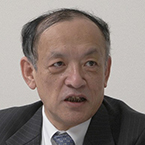
Scientific Areas of Expertise: Cell Death Mechanisms; Cytokine-mediated Signal Transduction; Flippases and Scramblases
For fundamental work dedicated to categorizing crucial steps required for cellular apoptosis, namely, the identification of the Fas membrane protein as a member of the tumor necrosis factor receptor family, and for defining the role of the Fas ligand as an inducer of apoptotic signaling, a finding that would result in the further characterization of this signaling pathway as an essential pathway for immune system regulation and tumorigenesis.
Dr. Nagata, a world-renowned scientist, has made groundbreaking contributions to understanding cellular apoptosis. His pioneering research has been vital in identifying the molecular mechanisms driving cell death. Notably, he discovered that the membrane protein Fas is part of the tumor necrosis factor receptor family and demonstrated that its ligand, FasL, triggers apoptotic signaling. Dr. Nagata further linked the Fas/FasL pathway to disease by identifying loss-of-function mutations in Fas and FasL in mouse models of lymphadenopathy and autoimmune disease, including systemic lupus erythematosus.
Expanding on the downstream effects of this pathway, he elegantly showed that Fas-mediated apoptosis activates caspases, which then trigger the DNA cleavage enzyme DNase (caspase-activated DNase, CAD) to fragment DNA into nucleosomal units. This work laid a critical foundation for understanding cell death mechanisms.
His subsequent work revealed that apoptotic cells expose phosphatidylserine (PtdSer) on their surface, serving as an “eat me” signal for their removal. Identifying MFG-E8 and Tim4 molecules, which connect macrophages to dying cells with exposed PtdSer, he provided crucial insights into efferocytosis–the process by which macrophages engulf apoptotic cells. More recently, Dr. Nagata has elucidated the biochemistry behind the flipping and scrambling of phospholipids in the plasma membrane, leading to PtdSer exposure in apoptotic cells.
His work has profound implications for human health, showing that defects in apoptosis, efferocytosis, and phospholipid distribution in the plasma membranes can lead to cancer, autoimmune diseases, and neurodegenerative conditions.
Selected Awards and Honors
2021 Pioneer Award, Australasian Cell Death Society, Melbourne, Australia
2019 ECDO Honorary Award, European Cell Death Organization, Ghent, Belgium
2017 Cell Death and Differentiation Award, Cell Death and Differentiation Press, London, United Kingdom
2015 Foreign Associate, National Academy of Sciences, Washington, DC
2013 Keio Medical Science Prize, Keio University, Tokyo, Japan
2012 Debrecen Award for Molecular Medicine, University of Debrecen, Debrecen, Hungary
2012 Tomizo Yoshida Award, Japanese Cancer Association, Tokyo, Japan
2012 Honorary Doctorate, University of Zurich, Zurich, Switzerland
2010 Member, Japan Academy, Tokyo, Japan
2004 International Cell Death Society Award, International Cell Death Society, New York
2001 Person of Cultural Merit, Tokyo, Japan
2000 Imperial Prize and Japan Academy Prize, Japan Academy, Tokyo, Japan
1998 Asahi Prize, Asahi Shimbun and Asahi Shimbun Foundation, Nakanoshima, Japan
1996 Prix Lacassagne, French League Against Cancer, Paris, France
1995 Robert Koch Prize for Excellence in Scientific Achievement, Robert Koch Foundation, Berlin, Germany
1994 Emil von Behring Prize, University of Marburg, Marburg, Germany